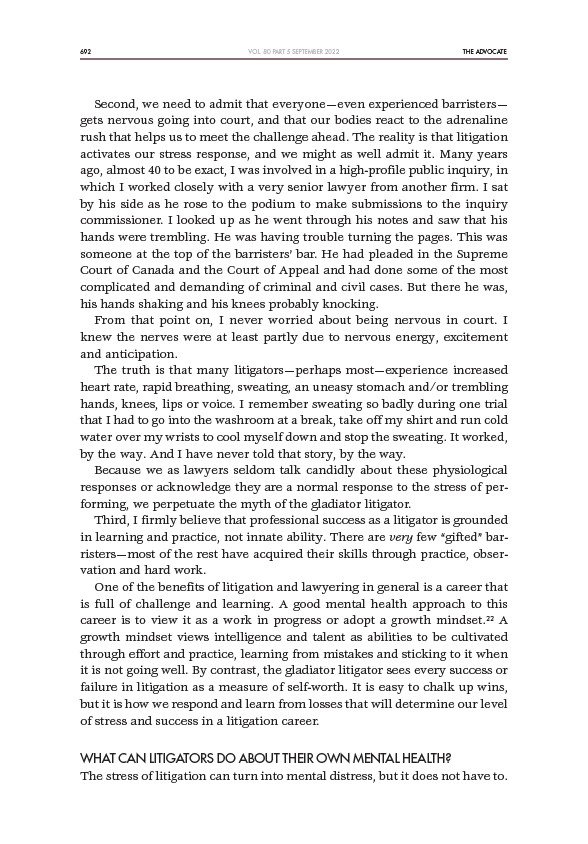
692 THE ADVOCATE
VOL. 80 PART 5 SEPTEMBER 2022
Second, we need to admit that everyone—even experienced barristers—
gets nervous going into court, and that our bodies react to the adrenaline
rush that helps us to meet the challenge ahead. The reality is that litigation
activates our stress response, and we might as well admit it. Many years
ago, almost 40 to be exact, I was involved in a high-profile public inquiry, in
which I worked closely with a very senior lawyer from another firm. I sat
by his side as he rose to the podium to make submissions to the inquiry
commissioner. I looked up as he went through his notes and saw that his
hands were trembling. He was having trouble turning the pages. This was
someone at the top of the barristers’ bar. He had pleaded in the Supreme
Court of Canada and the Court of Appeal and had done some of the most
complicated and demanding of criminal and civil cases. But there he was,
his hands shaking and his knees probably knocking.
From that point on, I never worried about being nervous in court. I
knew the nerves were at least partly due to nervous energy, excitement
and anticipation.
The truth is that many litigators—perhaps most—experience increased
heart rate, rapid breathing, sweating, an uneasy stomach and/or trembling
hands, knees, lips or voice. I remember sweating so badly during one trial
that I had to go into the washroom at a break, take off my shirt and run cold
water over my wrists to cool myself down and stop the sweating. It worked,
by the way. And I have never told that story, by the way.
Because we as lawyers seldom talk candidly about these physiological
responses or acknowledge they are a normal response to the stress of performing,
we perpetuate the myth of the gladiator litigator.
Third, I firmly believe that professional success as a litigator is grounded
in learning and practice, not innate ability. There are very few “gifted” barristers—
most of the rest have acquired their skills through practice, observation
and hard work.
One of the benefits of litigation and lawyering in general is a career that
is full of challenge and learning. A good mental health approach to this
career is to view it as a work in progress or adopt a growth mindset.22 A
growth mindset views intelligence and talent as abilities to be cultivated
through effort and practice, learning from mistakes and sticking to it when
it is not going well. By contrast, the gladiator litigator sees every success or
failure in litigation as a measure of self-worth. It is easy to chalk up wins,
but it is how we respond and learn from losses that will determine our level
of stress and success in a litigation career.
WHAT CAN LITIGATORS DO ABOUT THEIR OWN MENTAL HEALTH?
The stress of litigation can turn into mental distress, but it does not have to.